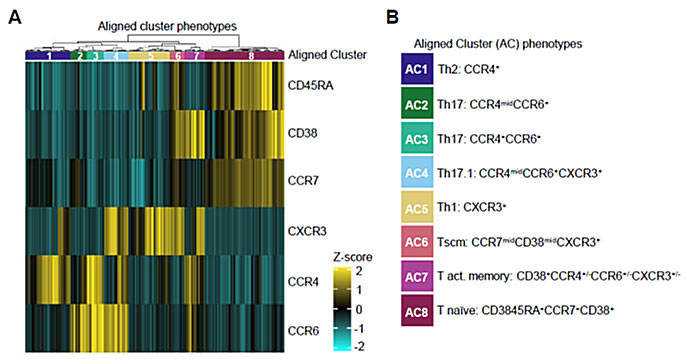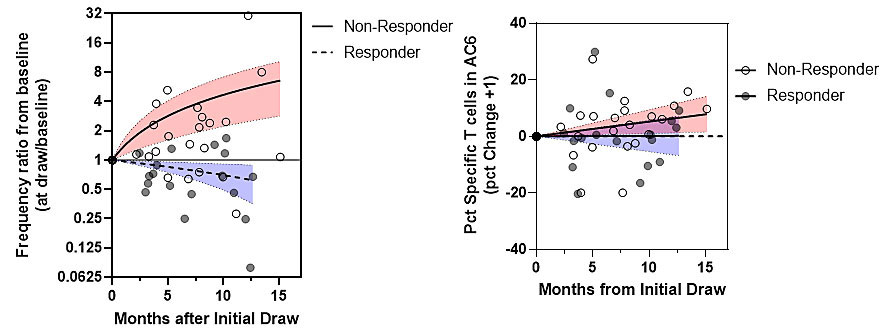Session Information
Date: Monday, November 14, 2022
Title: T Cell Biology and Targets in Autoimmune and Inflammatory Disease Poster
Session Type: Poster Session D
Session Time: 1:00PM-3:00PM
Background/Purpose: In Rheumatoid arthritis (RA) citrullinated antigen reactive T cells are key drivers of disease, but knowledge about their relative number and phenotype remains limited. Therefore, we characterized antigen-specific T cells in peripheral blood samples from well-characterized subjects with RA.
Methods: We implemented an HLA class II tetramer panel to characterize epitope-specific T cells and applied a computational method (DISCOV-R) to define phenotypic clusters using cross-sectional samples from 66 seropositive RA subjects and 30 matched controls. We then applied these cluster definitions to longitudinal samples from seropositive RA subjects with active disease (initial RAPID3 > 2.3) stratified into responders (RAPID3 reduced to < 2.3 following change in therapy, n=9) and non-responders (maintained RAPID3 > 2.3, n=13) to identify T cell traits that correlate with treatment response.
Results: Antigen specific T cells were detectable in seropositive RA at higher overall frequencies than in control subjects. In one subgroup, aggrecan, vimentin and fibrinogen specific T cells were predominant whereas α-enolase was predominant in a second sub-group. The global phenotypic landscape of CD4+ T cells included eight aligned clusters (AC), corresponding to known functional lineages. Among these, one Th17-like (CCR4+CCR6+) cluster was higher in RA subjects than controls and another Th17-like (CCR4midCCR6+) cluster increased with higher disease activity. T cell phenotype differed based on antigen specificity. Aggrecan and CILP-specific cells were enriched in individual Th2-like or naïve clusters, respectively, whereas alpha-enolase, vimentin and fibrinogen specific cells were more broadly distributed among several clusters. Generalized linear modeling of antigen specific T cell phenotypes revealed a significant enrichment of mature memory lineages with increased disease duration. Increased disease activity was positively correlated with Th1-like (CD45RA-CXCR3+) vimentin and fibrinogen specific T cells and negatively correlated with Tscm-like (CD45RA+CXCR3+) vimentin, fibrinogen, and CILP specific cells. Comparing responders and non-responders at baseline revealed differences in overall T cell number and the frequency of Th2-like (CD45RA-CCR4+) T cells. There were significant longitudinal changes in T cell frequency and phenotype. Non-responders exhibited increased overall numbers of antigen specific T cells over time, whereas numbers decreased in responders. Furthermore, a Tscm-like (CD45RA+CXCR3+) cluster increased over time in non-responders but exhibited no change in responders.
Conclusion: These findings show that the character of antigen specific T cells is influenced by epitope specificity, disease duration, and disease activity in RA. Furthermore, key baseline characteristics and longitudinal changes in the number and phenotype of antigen specific T cells correlate with treatment outcome. This supports the measurement of T cell phenotype to understand the effects of immunologic therapy and implicates potentially pathogenic populations of T cells that may accumulate in the absence of effective therapy.
To cite this abstract in AMA style:
Rims C, Muir V, Hocking A, Posso S, Bukiri H, Carlin J, Ng B, Linsley P, James E, Buckner J. Changes in the Number and Phenotype of Citrullinated-Antigen Specific T Cells Correlate with Treatment Outcome in Seropositive Rheumatoid Arthritis [abstract]. Arthritis Rheumatol. 2022; 74 (suppl 9). https://acrabstracts.org/abstract/changes-in-the-number-and-phenotype-of-citrullinated-antigen-specific-t-cells-correlate-with-treatment-outcome-in-seropositive-rheumatoid-arthritis/. Accessed .« Back to ACR Convergence 2022
ACR Meeting Abstracts - https://acrabstracts.org/abstract/changes-in-the-number-and-phenotype-of-citrullinated-antigen-specific-t-cells-correlate-with-treatment-outcome-in-seropositive-rheumatoid-arthritis/


